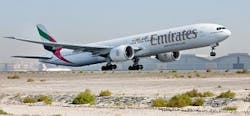Boeing projects $450 billion demand for 2,520 new airplanes in Middle East over next 20 years
DUBAI, United Arab Emirates, 15 Nov. 2011. Executives at The Boeing Company (NYSE:BA) forecast that Middle Eastern airlines will require roughly 2,520 airplanes, with a total value of $450 billion, by 2030. The Middle East's passenger airplane fleet is expected to grow from a current fleet of 1,040 airplanes to a projected 2,710 airplanes, for an increase of 160 percent. Thirty-four percent of the projected demand will be for airplanes to replace current aircraft; 66 percent will be for fleet expansion, as the region's airlines gear up for significant growth over the next two decades.
Single- and twin-aisle airplanes will account for 90 percent of the Middle East's new airplane deliveries over the 20-year period, according to the Boeing forecast. Roughly 1,160 single-aisle jets, including the Boeing 737 MAX, and 1,110 twin-aisle airplanes, such as the Boeing 777 and 787 Dreamliner, are forecast to be delivered to the region during this time. The remaining ten percent is split between large airplanes, such as the Boeing 747-8 Intercontinental and will account for 7 percent of projected demand, with an estimated 180 airplanes to be delivered to airlines in the Middle East. Regional jets account for the remaining 3 percent.
"The Middle East has seen an unprecedented growth in capacity over the past 10 years and every indication points to a further, significantly large increase over the next 20 years," explains Randy Tinseth, Boeing Commercial Airplanes vice president of marketing, who presented Boeing's Current Market Outlook at the 2011 Dubai Air Show. "The region's airlines with their forward-thinking approach have become a competitive force globally.
"The collective capacity of three airlines--Emirates Airline, Etihad Airways, and Qatar Airways--has grown by an average of 23 percent annually over the past decade and we expect this trend to continue well into the future. All three airlines base their growth strategies on the principle that newer, more efficient airplanes will provide a competitive advantage over their rivals from Europe and Asia," Tinseth adds.
Boeing, as of September 14, 2011, had a backlog of 300 airplanes in the Middle East. Customers in the region count for a large share of Boeing's twin-aisle backlog, accounting for 26 percent of 777s and 15 percent of 787s on order. Boeing currently has a total of 47 customers in the region that operate an estimated 1,200 flights per day on 425 Boeing airplanes.
